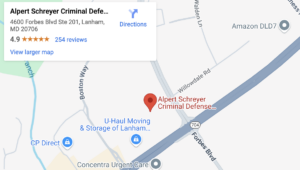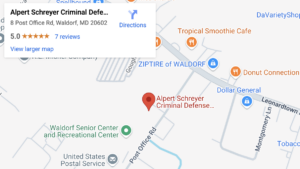
Contrary to what some Maryland drivers may believe, a police officer need not suspect that you have been drinking and driving in order to pull your vehicle over. On the contrary, a police officer can pull you over for violating any traffic law or regulation. These types of stops are known as pretextual stops.
Contact Alpert Schreyer Criminal Defense Attorneys at (301) 262-7005 for a free consultation.
Some of the reasons why a police officer may pull you over include:
- Speeding
- Tail light out
- Headlight out
- Restricted visibility (e.g., excessive window tinting)
- Expired registration tags on your vehicle
- Erratic driving (e.g., weaving in and out of traffic)
In order to pull you over, the officer merely needs to have a reasonable suspicion that you have done something wrong. Although the police officer may technically be pulling you over for a relatively minor civil infraction or violation, the officer may actually have an ulterior motive. In other words, the officer may be pulling you over in order to determine whether or not you are under the influence of alcohol.
What Happens During a DUI/DWI Traffic Stop

During a DUI traffic stop in Maryland, several things will typically occur. First, the officer will ask for your driver’s license and registration. Some officers are very forward with drivers and may come right out and ask whether or not you have been drinking.
During this stage of the process, it is important that you remain calm, that you be respectful, and that you comply with the police officer’s instructions. At this stage, mouthing off to the officer or being disrespectful to him or her will only make an already bad situation much worse.
If you have in fact been drinking, it is important to keep in mind that it is not mandatory that you provide answers to any of the officer’s questions. You can politely refuse to answer the officer’s questions at this juncture by asserting your Fifth Amendment rights.
You do not want to answer the officer’s questions because anything that you say at this stage can be used against you later on in the process. Your best bet at this point is to simply remain quiet and refrain from answering the officer’s questions




